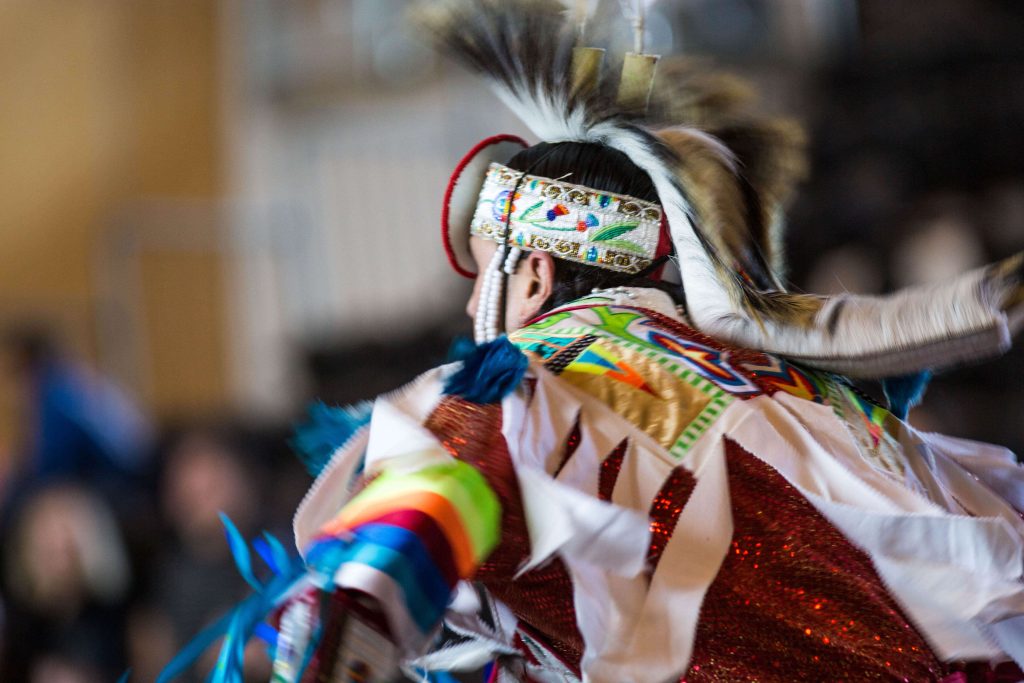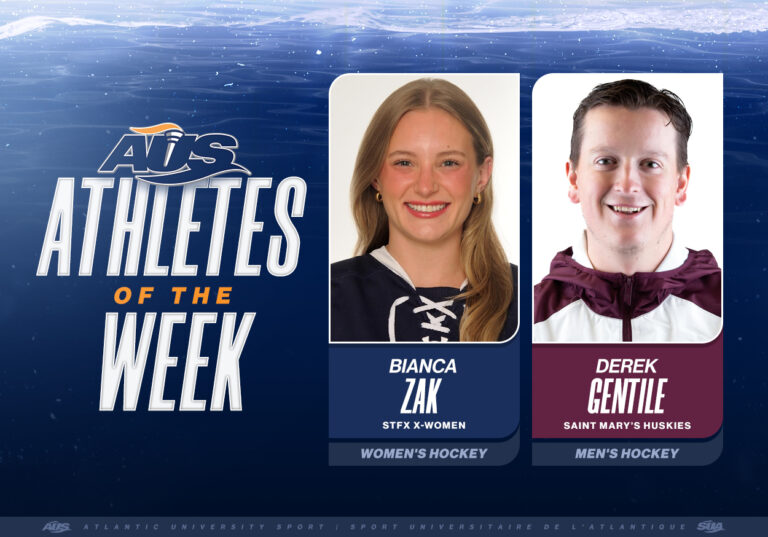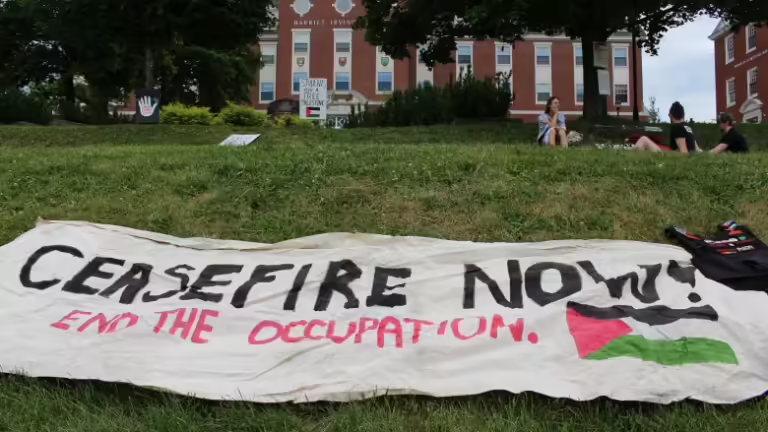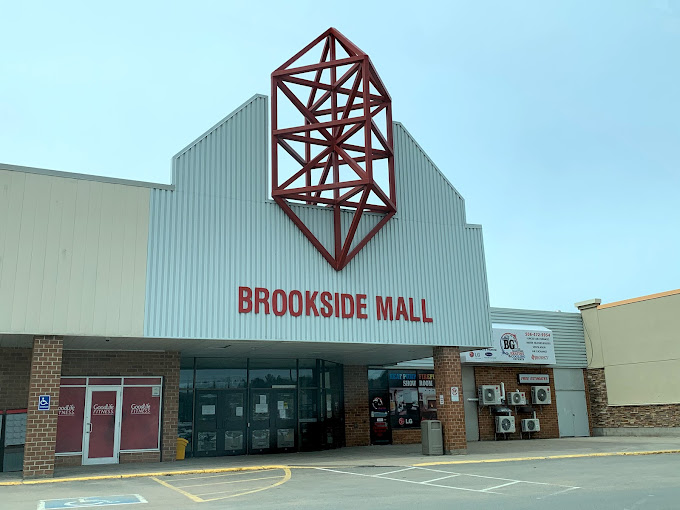On Thursday the Mi’kmaq Wolastoqey Centre (MWC) held their fourth annual powwow at UNB. The event was held in the Richard J. Currie Center in the performance hall, with vendors spilling out into the long hall and fourth floor entrance.
The theme of this year’s powwow was unity, and the MWC encouraged everybody to come out. A post on powwow etiquette from the event page was shared almost 100 times. Meant to ease the hesitancy of people who have never attended, it recommended listening to the Master of Ceremonies for guidance and showing respect to the Elders, dancers and drummers at the event who work hard to keep the culture alive.
The powwow was held from 11 a.m. to 4 p.m., with the opening ceremonies lasting almost an hour. Dancing took place in performance hall and participants could win prizes for contests held during intertribal dances, such as a Crowne Plaza hotel room to the winners of the team dance competition.
Vendors inside and outside of the performance hall sold traditional clothing, jewellery and crafts. Food vendors and different organizations such as the Fredericton public library, St. Thomas University and the Maliseet Nation Conservation Council.
Alexa Metallic, Indigenous Representative for the STU Student Union attended the powwow and said “it was beautiful to be around such a rich culture and to be around people like me.” Metallic bought earrings at the event, and said it was because she loves the uniqueness of beadwork.
Like the MWC, Metallic was supportive of non-Indigenous folks attending the event. “It’s a very welcoming and inclusive environment,” she said, “Everyone should go at least once.”

Grand Entry starts the powwow “in a good way” says Master of Ceremonies Possesom
Possesom, the Master of Ceremonies, said the Grand Entry is meant to “bring it in, in a good way” before the welcoming prayers and speeches of the powwow’s opening ceremonies.
The Grand Entry was led by six flag carriers, “representing all of the people’s here today,” according to Possesom. Head dancers Bronson Acquin-Mandisodza and Amanda Reid plus the two junior head dancers came next in the procession, followed by a group of dignitaries that included UNB Chancellor Allison McCain, Lieutenant-Governor Jocelyne Roy-Vienneau and Chief of the Wolastoq Grand Council Ron Tremblay.
“[We are] honouring you for coming to join our circle,” said Possesom to the dignitaries. Warriors and protectors, groundskeepers and the future generation were the dancers that followed the dignitaries to complete the procession.

The Grand Entry was led by host drum, the Muskrat Singers, just one of six different drumming circles at the powwow.
The Birch Creek drumming circle performed the song for the veteran’s dance, which was led by the head dancers and which all veterans, police officers and other “warriors who have stood for our rights” were invited to participate in.
“We open all our ceremonies this way because we do not forget that we honour all our warriors on both sides,” said Possesom, who said powwows have always been a time of peace between peoples and a celebration and honouring of culture.
Head dancers for the event were Bronson Acquin-Mandisodza and Amanda Reid. Possesom was the Master of Ceremonies and on the host drum were the Muskrat Singers.
Miigam’agan, St. Thomas University’s Elder-in-Residence, was Elder of the powwow. She gave the opening prayer before she addressed the crowd in English.
“We have an opportunity today to celebrate and thank our Creator,” said Miigam’agan, “to come through the winter months and be here in springtime to celebrate the new life,” Miigam’agan explained that the dancing, drumming and singing was their way of acknowledging this new life as well as acknowledging their language, land and history.

Lots of speeches made during the opening ceremonies
The opening ceremonies lasted around an hour. Tremblay was the first to give a speech after the opening prayer. He told a story of the “young rainbow warriors” who were going to “stand up and fight” against the injustices to the Earth, using the knowledge of universities and wisdom of elders.
“There will be some of our people that will not listen,” said Tremblay, “[but our] rainbow warriors will stand together hand in hand, protecting our lakes, rivers and oceans. I see them today. Don’t think of a warrior as a forceful violent—they’re precious, they’re knowledgeable and they’re wise.”
President of UNB Eddy Campbell went up next to speak and after expressing his gratitude for various blessings—being invited to the event, having changemakers David and Imelda Perley at the MWC, young people showing up—Campbell shared news of the university’s recently released 10-point action plan around Indigenizing the academy.
“We want to ensure every Indigenous person who comes our way feels at home with us,” said Campbell.’


New Brunswick lieutenant-governor Roy-Vienneau spoke next in both English and French and said the powwow, as “a celebration of thousands of years of culture and tradition” was about “sharing and teaching [to people like her], honouring those who are here in spirit [and] looking forward to the future together.”
Roy-Vienneau congratulated the organizers for embracing diversity, and said “friendship not hardship.”
UNB chancellor McCain chose to linger on the theme of the powwow during his address to the audience. “UNB like the wider world is a culture of vibrant cultures,” said McCain. “We should be able to live together with kindness and respect.”
McCain said events like today’s powwow were a reminder that it’s sometimes necessary to go out of way to welcome, embrace, celebrate and understand others. Events like this, he said, also helped “demonstrate to the broader community that unity is essential to our future.”

Green Party leader and MLA from Fredericton South David Coon took time in his speech to express the growth of the powwow from when it first began, commenting that there were “more drums than I’ve ever seen in this powwow before.”
“It is a real change from some years ago when the university really only had special events organized once in a while,” said Coon. “This powwow now has become a tradition, and I want to acknowledge the leadership that’s helped make this happen.”
David Perley director of the MWC was the last one to speak before the Muskrat Singers played a song to introduce the head dancers, whose role is to help lead people through the powwow. Muskrat singers did song for them. This signified the end of opening ceremonies.





